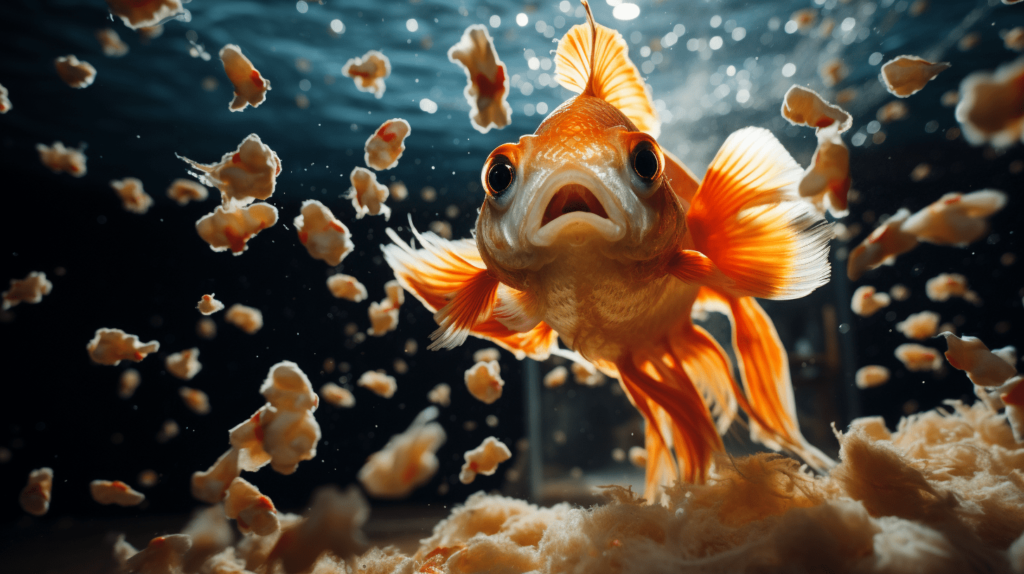In the vast ocean of dietary options for fish, feeding them popcorn may seem as peculiar as finding a fish out of water. However, like the ebb and flow of the tides, understanding the intricate balance of fish nutrition requires exploring all possibilities.
This article delves into the world of fish diets, shedding light on whether popcorn can be a suitable snack. By navigating through the depths of fish nutrition, we can unlock the secrets to their health and well-being.
Key Takeaways
- Fish can eat small amounts of air-popped popcorn as an occasional treat.
- The ability of fish to digest popcorn depends on factors such as the type of popcorn and the fish’s natural feeding pattern.
- Popcorn has an impressive nutritional profile and offers various health benefits for fish, including high fiber content and vitamins and minerals.
- It is essential to consult with a vet to understand your fish’s unique species, dietary needs, and feeding patterns before deciding to feed them popcorn.
Factors Affecting the Digestibility of Popcorn for Fish
One of the factors that can affect the digestibility of popcorn for fish is their natural feeding pattern, which varies among different species. Fish have diverse dietary needs, some being herbivorous, carnivorous, omnivorous, or omnivorous.
Purely carnivorous fish require a high-protein diet that popcorn cannot provide. On the other hand, omnivorous fish may digest popcorn more quickly due to their ability to consume both plant and animal matter.
Understanding the natural feeding pattern of your fish is crucial in determining whether popcorn is a suitable addition to their diet. It is essential to conduct research or consult a veterinarian to gain insight into the specific dietary requirements of your fish species.
Natural Feeding Patterns of Fish and Popcorn Compatibility
The diverse natural feeding patterns of fish play a significant role in determining the compatibility of popcorn as a dietary addition. Understanding these feeding patterns is crucial in providing appropriate nutrition to our aquatic pets. Here are three key points to consider:
- Different fish have different natural feeding patterns, including herbivorous, carnivorous, omnivorous, and omnivorous. This means some fish may be better suited to digesting popcorn than others.
- Popcorn can offer nutritional benefits to fish, such as high fiber content and essential vitamins and minerals. However, it is vital to ensure that popcorn is not the sole source of nutrition for fish, especially for purely carnivorous species.
- Feeding fish with popcorn requires certain precautions, such as avoiding salted popcorn and choosing kernel-less options to prevent choking hazards. Consulting a veterinarian and understanding the specific dietary needs of your fish is essential for their well-being.
Nutritional Benefits of Popcorn for Fish
Popcorn, with its high fiber content and essential vitamins and minerals, offers nutritional benefits for fish with caution when incorporated into their diet. The high fiber content in popcorn is particularly beneficial for omnivorous fish, as it supports their digestive health.
Additionally, popcorn is a good source of vitamins B6, B3, and B1, as well as phosphorus and potassium, which are essential for the overall well-being of fish.
However, it is essential to note that purely carnivorous fish require a high-protein diet that popcorn cannot provide. Therefore, it is crucial to understand your pet fish’s dietary needs and natural feeding patterns before introducing popcorn into their diet.
Consulting with a veterinarian is recommended to ensure that popcorn is a suitable and safe addition to your fish’s nutritional intake.
When feeding fish popcorn, choose kernel-less popcorn to avoid choking hazards and chop larger pieces into smaller bits for easier consumption. Avoiding salted popcorn is essential, as the excess salt can lead to digestive problems in freshwater fish.
Feeding Guidelines for Popcorn and Fish
Many fish species can safely consume limited popcorn as an occasional treat. Still, following proper feeding guidelines and consulting with a veterinarian for specific recommendations is essential.
- Popcorn can provide a high fiber content that is beneficial for the dietary needs of omnivorous fish.
- Understanding the natural feeding patterns and dietary needs of your pet fish is crucial before incorporating popcorn into their diet.
- Choosing kernel-less popcorn and chopping it into smaller bits can help reduce the risk of choking fish.
Feeding guidelines for popcorn and fish should be based on the individual species and nutritional requirements of the fish in question. Consulting with a veterinarian will ensure you provide the right amount and type of popcorn for your fish. Prioritizing their health and well-being is essential, and understanding the specific guidelines for feeding popcorn to fish will help you make informed decisions.
The Risk of Unpopped Popcorn Kernels for Fish
Unpopped popcorn kernels pose a potential choking hazard for fish, but careful feeding practices can mitigate the risk. When feeding fish popcorn, it is essential to choose kernel-less popcorn to avoid any potential choking hazards. Additionally, chopping larger popcorn pieces into smaller bits can make swallowing easier for fish.
Feeding fish with air-popped popcorn is also recommended to avoid excess calories and fat. It is crucial to prioritize the safety of fish when offering them popcorn as a treat. Unpopped kernels should be avoided to prevent harm to the fish’s tiny mouth and food pipe.
Why Salted Popcorn Is Not Suitable for Fish
Salted popcorn, due to its high sodium content, can disrupt the delicate balance of a fish’s digestive system and is not suitable for consumption. Fish have specific dietary needs and feeding patterns that should be considered when providing them with snacks. Here are three reasons why salted popcorn is not suitable for fish:
- High sodium content: Salted popcorn contains excessive amounts of sodium, which freshwater fish are not meant to consume in large quantities. This can lead to digestion problems and disrupt the natural feeding patterns of fish.
- Imbalanced diet: Fish require a well-rounded diet that includes proteins, vitamins, and minerals. Salted popcorn does not provide the nutrients that purely carnivorous fish need for optimal health.
- Health concerns: Feeding fish salted popcorn can negatively impact their health and well-being. It is important to prioritize their dietary needs and provide suitable food options.
Conclusion
In conclusion, the digestibility of popcorn for fish depends on their specific species and dietary requirements. While popcorn can provide some nutritional benefits, it is essential to consider the natural feeding patterns of fish and consult a veterinarian before introducing it into their diet.
Additionally, precautions should be taken to avoid the consumption of unpopped kernels and salted popcorn, as they can pose risks to fish.
By understanding these factors and feeding guidelines, we can ensure the well-being of our aquatic companions.



